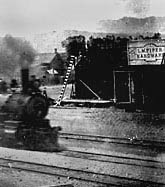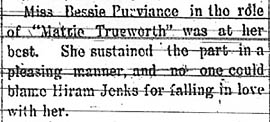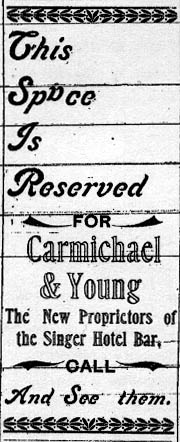
What wasn’t quite official in the Lovelock Tribune on December 15, 1899, became official in the Humboldt County Courthouse in January 11, 1900. The Purviances were now the owners of record of the Singer Hotel. With legalities out of the way, Madison proudly decided it was time to place his own personal stamp on the property!  Early on, the Singer Hotel building was first known by the name The Adobe. About 1894, the name the Singer Hotel was first reported on the tax records on the property. But no matter what the name on the building, all the locals always remembered The Singer Hotel as George Singer’s property. Mr. and Mrs. George Singer were among the early settlers to the valley and Singer was a good friend of Lovelock’s namesake and founder, George Lovelock. But that was about to change… |
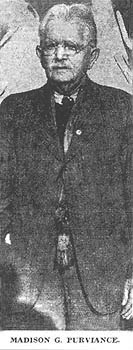 |
Madison Gates Purviance The first telling of the story of Edna Purviance’s father Research by Linda Wada © - November 2003-2016 Part Five – The Workingmen All in the Name The Workingmen Years
Lovelock was full of hard-working families too. Families who stayed on after their forefathers first moved to the area, or newcomers like the Purviances and Lynip, looking for new beginnings. The Purviances found that new start at The Singer Hotel. |
|
It was a lot of work running a hotel. In many ways, running a hotel business is 1900 was the same as running a hotel today. The rooms had to be cleaned, the beds made, building maintained and the money collected. But The Singer Hotel didn’t have phones, fax machines, computer reservations and all the other items taken for granted today. Typewriters were not even part of everyday daily life in Lovelock in 1900. Reservations and bookkeeping were all done carefully by hand with pen and ink. |
Working on Appearance In 1900, Lovelock was taking on an appearance of a more vibrant western city. Wooden sidewalks were being extended to connect business blocks together. Gravel paths were used to create mud-free zones between the storefronts and train station. Horses and buggies still ruled the day in 1900, and all the roads were dirt with some gravel. Water wagons would spray the streets in summer to help keep the dust down. The townspeople worked hard to make daily life pleasant. In Madison's case, as well as many other family-run businesses, having an appealing and inviting storefront was quite important. Madison decided to include his business neighbors on the block, William O’Leary, next door in Lot 17, and his brother in law Lester Piper, in city lot 16, in the improvements. Madison ordered 21 trees, and the team planted the trees around the three business properties. The local paper was quick in reporting the pleasant new look around of the properties. New coats of paint were added to freshen the outside of the building, and some even added a fresh paint coat inside. New signs were also ordered and erected. O’Leary and Piper were reported first in having their new signs on their storefronts. It seems people were impressed with the new look, but it was the new sign Madison added a short time later that caused the biggest stir in town. |
 Madison changes the name to The Workingmen's Hotel and Bar Hotel. Lovelock Tribune - May 19, 1900 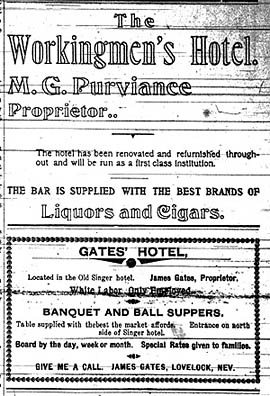
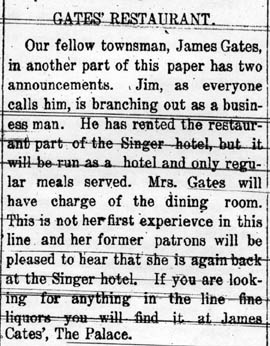 Lovelock Tribune - May 26, 1900 |
The Singer, no more... In May of 1900, The Singer Hotel name was removed and replaced with The Workingmen’s Hotel and Bar.
Lovelockers didn’t mind change, but some things are best left alone. In fact, in reading the newspaper reports in the coming months and years, it was not popular with anyone. They did not like the new name attached to their well-known landmark. George Singer was much beloved in Lovelock and still a resident in town. The building was identified with Singer, no matter who owned or ran the hotel. Madison knew this fact and may wanted to have a place that was his, and not George Singer’s. Piper's was Piper Hardware and Brown's was C.B. Brown. So why not the Purviance Hotel? Well, in the coming months and years, the Purviance Hotel would become a popular name in the local newspaper articles, but not in the official ads. The new name certainly didn’t have the same classic sound as the Singer Hotel. And where Madison got this name could be from his working class background, or from the fact The Workingmen’s Party was a popular political party in Nevada. The local newspapers rarely used the new name, except in ads. Madison might have done better to call it the Purviance Hotel. But for the next few years, The Workingmen’s Hotel and Bar would be the name people would get most accustomed to seeing.
Jim and Cora Gates leased the café and a few of the rooms at The Workingmen’s Hotel. The Gates ran ads announcing this change. Louise now had fewer rentals to care for. Leasing most of the hotel to others freed up more time for the Purviance family to devote to other activities. The newspapers do reflect these changes as Louise and the girls started to appear more frequently at Lovelock social events. While Madison’s name didn’t appear in connection with a singing event or church gathering, his name did show up as manager of The Workingmen’s Bar for that year. But whose idea was it to lease out more of the hotel? |
Daily Life at the Workingmen's During the spring and summer of 1900, ice cream socials at the hotel were replaced with gatherings held by the Ladies Aid Society. The Ladies Aid was a church organization that raised money for community projects and people in need. Music events, special shows, dances and ice cream socials were just some of the ways the group raised money. Many of the gatherings were held at the church, while some parties were held at the hotel. Meetings could also have been easily held at the hotel. This was during a period where Louise's and Bessie’s names would show up frequently at music events around town.
Bessie had a lead role in ‘Enlisted for the War’. She got a good review, and her and the whole cast were given a rousing send off from the Lovelock Depot, as the group traveled to neighboring Winnemucca and other towns. Edna had to be proud and excited seeing her older sister off! The play had a successful run in Humboldt County as the group toured different towns in the area. But touring had its risks! And Bessie Purviance became a victim! The more crooked-minded people weren’t interested in seeing the beautiful Bessie acting! The problem was that anytime a big event arrived at a small town, nearly the whole town would attend. Unguarded homes and rooms would fall prey to thieves! In the first robbery of its type in Golconda Hot Springs Hotel, Bessie Purviance was robbed of her gold watch and chain (property of Louise's) and eight dollars in gold coins. If the family was wired about this, Louise had to read the telegram, because Madison was nursing a badly broken hand after falling off a freight train. He was taking a short cut across the train tracks, instead of crossing at the railroad bridge (see picture above of railroad bridge). But Bessie wasn’t the only Purviance daughter performing during this same time in the spring of 1900. It was time for a future silver screen star to shine! |
Edna Purviance Performs! Information about Edna’s early years seems to be a recycling of the same information from a few sources. In the articles about Edna I have read, there is little mention of her early exposure to entertaining. It may not been professional, like on a New York stage, but was still professional in manner. Edna was four years old in the spring of 1900 and got to watch many times over her mother and sisters perform. She was part of a very musical and performing family, so it was a natural for Edna to follow her sisters and mother. I have never read any mention before of the musical family that Edna actually came from, and I was pleasantly surprised to uncover so much about this entertaining family. I know Edna played the piano, but I didn’t know her sisters and mother were involved with performing so much during their lives in Lovelock. Edna must had fun watching her older sister Bessie practice her parts for the play. Bessie was very close to her sisters, and Edna wasn’t in school yet, so Edna could have seen many of the rehearsals, even at such a young age. Judging from this discovery, it seems very natural for Edna to be so attracted to acting in silent films in her later years. And Edna’s experience started in 1900 performing in front of a live audience. On Easter Day, four-year-old Edna sang a duet with Helen Smith at the Annual Easter Celebration at the Lovelock Methodist Church! The Easter Event was the first mention I found of Edna performing in public, but not the only one. Edna sang at three events in 1900 that were publicized in the Lovelock Tribune. She was a bit younger than Charlie Chaplin was when he first sang before an audience on a London stage. Bessie, Louise and Edna’s cousins, Flora and Viola Piper, all sang at the Easter event. The Piper girls were Edna’s singing cousins, and they rehearsed many times together. It was a grand time for all! I have found no mention of Madison Purviance ever singing at any event, but it doesn’t mean he wasn’t there enjoying the festivities. I did find Madison at Myrtle's high school graduation in June of that year. A special dinner celebration was held after the ceremonies. While all the girls were studious, Myrtle was the most of all three and the most independent of this very independent trio of women. Nearly the whole town turned up for the event. At her graduation, Myrtle gave her speech on 'Science and Culture' and was praised in the local paper. Madison always seemed to show an interest in his daughters, for I found him mentioned often when his daughters were involved. He even tried a run for school board in 1900, but was not elected. |
 First time Edna was mentioned as a performer. She sang with Helen Smith on Easter 1900. Viola and Flora Piper were Edna's cousins.Louise and Bessie Purviance sang too. Lovelock Tribune - April 14, 1900 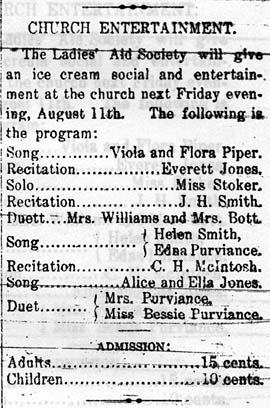 Edna Purviance sings again with Helen Smith at a special ice cream social on August 11th, 1900. Louise, Bessie and the Piper cousins, Viola and Flora Piper all join in this event for the Ladies Aid Society. Lovelock Tribune - August 11, 1900 |
With all the time his daughters and wife were spending with specials events, one has to wonder if all the socializing was not exactly what Madison wanted in his life. And there was Louise’s family visits too! Madison had his own family visit a few times, but Louise’s family visited the most with stays of a few days to a full week. Family friends from Paradise Valley came as well. Some of Bessie and Myrtle’s girlfriends would visit for a few days to sometimes two weeks!
The Lovelock paper would report how Louise's many guests enjoyed her parties. But she also ran her home, took care of business at the hotel, had a young daughter to raise and a husband watching the whirl. Life was busy. Life in Lovelock was certainly a more active one than the couple's old Paradise Days, where a stagecoach or wagon instead of a modern fast train brought friends and family to their door. And cleaning and caring for rooms meant mainly their own. Madison was not mentioned in the newspapers as much in late 1900 as he was earlier in the year, but he was busy running The Workingmen’s Bar and it seemed to be something he enjoyed doing. Madison seems the type who loved to sit and shoot the breeze with his friends, over a friendly drink. Cleaning and stocking the bar was just one of his daily routines, as he ran his ads about good cigars and drinks at The Workingmen's Bar. He seemed to have a firm hold on the running of the bar, and life appeared to be good, but was it? Maybe he was beginning to rethink that deal he made in January, with Louise destined to get full ownership of the property. But he still had his bar to keep him busy, as well as upkeep of The Workingmen's Hotel. He did a lot in the first half of the year, but was the clock ticking. By December of 1900, Madison's firm control of the bar would come to a sudden halt. |
New Workingmen's Bar Managers
This was the first major change in Madison’s work life since he arrived in Lovelock. I get the feeling from my research that he really enjoyed being bartender. He seemed to enjoy chatting with the guests. But now he had more free time then ever before. Why the change? It could be Louise wanted Madison out of the bar business or maybe Madison wanted more free time himself. Either way, this may have made thing worse for the Purviance family, for instead of having Madison busy with his own bar to run, Madison now had time to spend at all the other bars in town, and more chances to gamble. With nearly all the hotel leased out, time on the hands may have been the second factor that caused a wider gap between Louise and Madison. Louise was busy with her social and church activities. Madison was now freer to do other activities of his choosing. And with Louise rushing off to rehearsals, etc., plus visits from Louise’s relatives, the parade may have been more then Madison really wanted. There is no question Madison liked to drink and may have turned to the bars as his way of escape. In Madison, I never found in any my research so far the socialite and church-going person Louise was. Louise liked the company of others and having parties at her home, and high society parties were her favorite. She also spent a great deal of time at her church. Madison liked a good party, but maybe not with the same social groups as Louise. Madison unfortunately had a taste for gambling, which worried Louise a great deal. The couple needed to watch the funds because balance of the contract for the hotel would be coming due in about one year. Gambling has always been a problem in some families. From my research I have found that Madison always seemed to be looking for that big break. Gamblers believe the next card hand could be the long-awaited big win. But more times than not, they end up the big losers. Now Madison was heading for his biggest gamble: the future of his family, home and livelihood in Lovelock. The cards were dealt, and all he had left was to play his hand. |
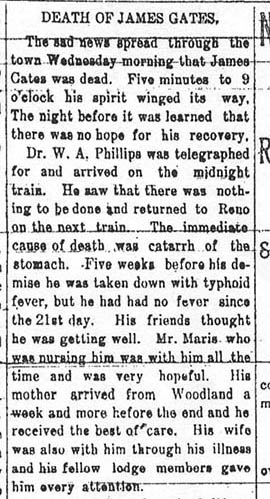 Jim Gates dies December 5, 1900 Lovelock Tribune - December 8, 1900  The annual Christmas Event was held each year on Christmas eve. This was Edna's last singing event for the year. Lovelock Tribune - December 29, 1900 |
As 1900 started with a funeral, it would end with a funeral. This time it was lessee of The Workingmen’s Hotel and Café, Jim Gates.
The news traveled quickly around town, and another large funeral was held that the Purviances attended. This left Cora Gates as the sole lessee on the hotel and café, which she continued into the following year. But the fever would visit many families in the valley and would come back calling on the Purviance family. The year 1900 saw many changes in the Purviance family life including for Edna. And it would end with a high note for Miss Edna!! Edna, now five, must have felt comfortable singing in front of an audience, and this time she would sing in front of her biggest crowd yet at the annual Christmas Tree Celebration held at the Lovelock schoolhouse. The Annual fundraiser was a local holiday favorite! Edna sang with a small group of children, so she wasn’t alone. Edna performed in front of a packed house, with her loving family and friends in full support, enjoying the best of the holiday season. The excitement was heightened by the anticipation that Santa Claus was coming! And at the end of the program Santa Claus arrived and handed out bags of candy, nuts and fresh fruit for all the children to enjoy. The evening was so successful that many people had to be turned away because the hall could not hold any more. |
The annual traditional New Years Eve Mask Ball ended the year, but things were not ever going to be the same again for the Purviances. The year 1900 saw many changes in the Purviance family life, and publicly things seemed to be going well. But the seams were coming apart privately. The Divorce... Continue |
Back to Top
All other content Copyright 2003-2016 - Edna Purviance, ednapurviance.org Research Collection
including photos and newspaper articles from public and private collections.
Linda Wada, WadaWorks, All Rights Reserved
Special thanks to the official county offices and libraries from Humboldt, Perishing and Butte County.
Letter from Edna to Chaplin - David Robinson's book Chaplin: His Life and Art

